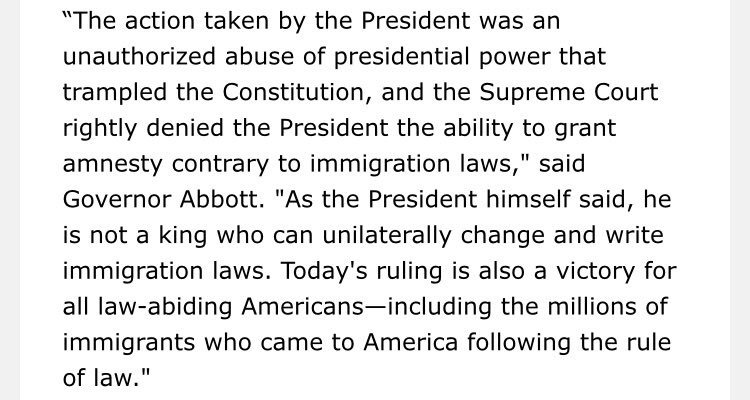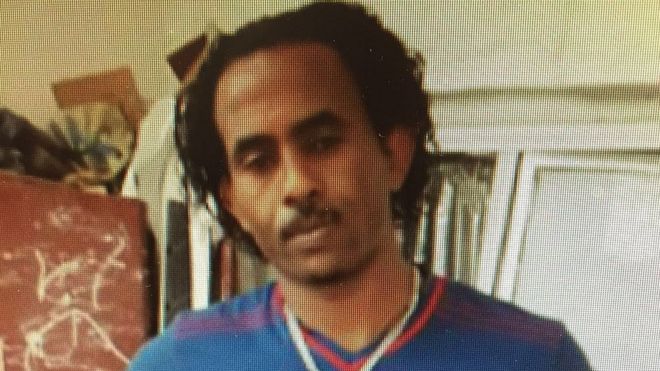The lower court decision stands. Obama said many times he did not have the authority and in the end, used executive action anyway. The Supreme Court, well 4 Justices stood with the Constitution and rule his action was not within his authority.
Texas Governor Greg Abbott had this response:
The Solicitor General, representing the Government in this case is Donald Verilli. As an aside, he resigned on June 2, and his last day is June 24th.
Now comes Secretary of the Department of Homeland Security, Jeh Johnson on the Supreme Court decision:
Statement by Secretary Johnson on Today’s Supreme Court Decision
Release Date:June 23, 2016
DHS: Like the President, I am disappointed by the Supreme Court’s 4-4 vote today in United States v. Texas. The case concerns Deferred Action for Parents of Americans and Lawful Permanent Residents (DAPA) and the expansion of Deferred Action for Childhood Arrivals (DACA). The 4-4 impasse leaves the court of appeals ruling in place and effectively prohibits us from implementing these important initiatives.
It is important to emphasize that this ruling does not affect the existing DACA policy, which was not challenged. Eligible individuals may continue to come forward and request initial grants or renewals of DACA, pursuant to the guidelines established in 2012.
We are also moving forward on the other executive actions the President and I announced in November 2014 to reform our immigration system. This includes our changes to the Department’s immigration enforcement priorities. Through these priorities, we are more sharply focused on the removal of convicted criminals, threats to public safety and national security, and border security. We have ended the controversial Secure Communities program. We are expanding policies designed to help family members of U.S. citizens and permanent residents stay together when removal would result in extreme hardship. And we have taken several actions to make it easier for international students, entrepreneurs, and high-skilled immigrants to contribute to the U.S. economy.
The President and I remain committed to fixing our broken immigration system. We are disappointed by the 4-4 vote in the Supreme Court today, and the gridlock in Congress that has stood in the way of more lasting, comprehensive immigration reform.
*****
FNC: The judgment could have significant political and legal consequences in a presidential election year highlighted by competing rhetoric over immigration. As the ruling was announced, pro-immigration activists filled the sidewalk in front of the court, some crying as the ruling became public. Critics of the policy touted the decision as a strong statement against “executive abuses.”
“The Constitution is clear: The president is not permitted to write laws—only Congress is. This is another major victory in our fight to restore the separation of powers,” House Speaker Paul Ryan said in a statement, adding that the ruling rendered Obama’s actions “null and void.”
Obama, though, said the decision “takes us further from the country that we aspire to be.”
He stressed that earlier changes his administration made to immigration policy are not affected, but acknowledged his most recent 2014 changes cannot go forward and additional executive actions are unlikely.
While Obama accepted the ruling, he also made his own full-court press, saying the split decision underscores the importance of the current court vacancy and the appointment of a successor to the late Justice Antonin Scalia, to “break this tie.” So far, Senate Republicans have not considered Obama’s nominee, Merrick Garland.
Meanwhile:
As Cubans rush through Texas, immigration policy questioned
From February to May, about 4,000 Cubans crossed over the Rio Grande River into Texas’ westernmost city. The number of Cubans coming to the U.S. has increased dramatically in the last few years. And it continues to rise, with about 77,000 Cubans entering between October 2014 and April 2016. Many are forgoing the typical route across the Florida Straits by boat to Miami and are traveling by foot, bus, boat and plane through Central America and Mexico to the Southwest border. More here.


 Mered Medhanie styled himself on the late Libyan leader Col Muammar Gaddafi
Mered Medhanie styled himself on the late Libyan leader Col Muammar Gaddafi